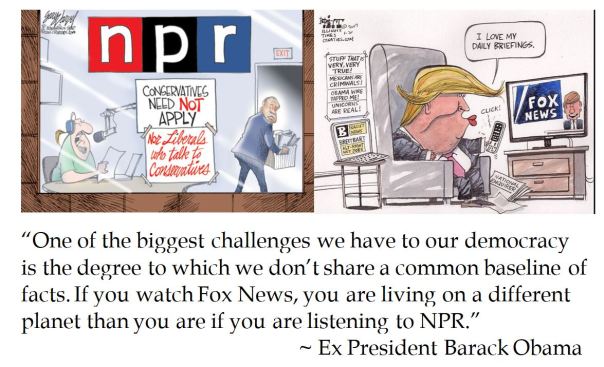During the initial episode of David Letterman's new limited run program on Netflix "My Guest Needs No Introduction", former President Barack Obama laments the lack of a common baseline of facts for the news.
In some ways, this echoes a theme that Mr. Obama emphasized in his BBC Radio interview with Prince Harry about finding common realities on the internet. And during the speech at the Dallas Police Shooting Memorial, then President Obama lamented political polarization stemming from news coverage.
Yet is is hard not to appreciate Obama's implication that those watching Fox News are "way out there" vis-a-vis the Mainstream Media represented by taxpayer supported National Public Radio. His quip served as a laugh line to the Netflix audience at City College, New York. Such a jibe will affirm the biases of coastal elites who cannot fathom how fly over country could vote for a guy like President Donald Trump. But it inspires a broader question of what is news and what is the prudent way to discern truth on current events.
 Some have fantasized about having a group that evaluates the news for its truthfulness. But as it has been tried by Politifact's Truth-o-Meter and the Washington Post's Fact Check with the Pinocchio scale, it has proven to be skewed and lacking.
Some have fantasized about having a group that evaluates the news for its truthfulness. But as it has been tried by Politifact's Truth-o-Meter and the Washington Post's Fact Check with the Pinocchio scale, it has proven to be skewed and lacking.
It is repugnant to the First Amendment to contemplate having the government take a role in vetting media. It is bad enough that social media giants like Facebook and Twitter are using "curating" newfeeds to avoid conservative stories deemed as "fake news" and algorithms which shadowbans opinions not in favor with the social media powers that be.
 Then there is the question of how to cover a story. Recently, CNN launched an advertising campaign with the spot "This is an apple" touting "Facts First". The Media Research Center's study of coverage of the first eight months of the Trump Administration was 91% negative stories. In another study, the MRC examined one day of coverage on CNN, when 92% of the airtime was focused on President Trump, and CNN used 96 critics and seven supporters to back up their coverage. That hardly seems like facts first or fair and balanced news.
Then there is the question of how to cover a story. Recently, CNN launched an advertising campaign with the spot "This is an apple" touting "Facts First". The Media Research Center's study of coverage of the first eight months of the Trump Administration was 91% negative stories. In another study, the MRC examined one day of coverage on CNN, when 92% of the airtime was focused on President Trump, and CNN used 96 critics and seven supporters to back up their coverage. That hardly seems like facts first or fair and balanced news.
A more difficult thing to detect is the news that the mainstream media chooses not to report. A concrete example is when undercover video exposed that Planned Parenthood clinics were selling baby body parts. Network news did not give one second of coverage, probably because it sullied a cause with which the networks suits agree. No wonder why there is a populist outcry against "Fake News".
Another niggling aspect is what "news" mainstream media outlets choose to report. It is interesting to see how much that makes it on a network nightly news is just recycled packages that were creating for fluffy morning news shows. ABC is notorious for cross promoting entertainment programming as news. The Tonya Harding 20/20 episode seemed to give as much airtime to its affiliated journalists as the protagonists in order to hype a film poised for Best Picture for the Oscars, which will be broadcast on ABC. One should expect that NBC's News will be chock full of Olympic feature stories (as it broadcasts the Winter Olympics in February) when it is not bashing the Trump Administration.
As a news junkie, it is laudable to seek out news sources which do not comfortably give "confirmation bias". In addition, it is necessary to vet the reliability of news sources when considering stories. However, it is dubious that President Obama wants to find a real "baseline of common facts". His out of this world comment seems more inclined to smear those who do not buy into the line from the mainstream media, shaped by the likes of the Journo-list and then disseminated via papers of record, like the New York Times and the Washington Post, which then dictates the coverage in most of the rest of the media.
As much as one would like to believe that Mr. Obama is trying to bridge news consumption universes, this comes from a leader who gathered lawmakers around a table supposedly to work together on health care and then wanted to dictate terms. It is likely that politically correct pressure about the consensus on the news would drown out minority opinions and counter facts. So it would be like the pre-internet "fairness doctrine" days when there was little choice and the public could be simply swayed.



No comments:
Post a Comment